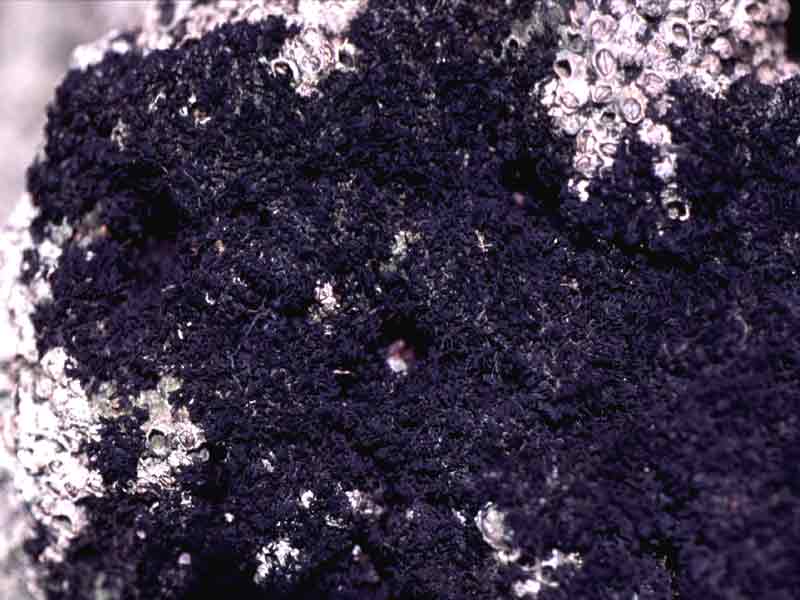Black lichen (Lichina pygmaea)
Distribution data supplied by the Ocean Biodiversity Information System (OBIS). To interrogate UK data visit the NBN Atlas.Map Help
| Researched by | Dr Harvey Tyler-Walters | Refereed by | Admin |
| Authority | (Lightf.) C. Agardh, 1817 | ||
| Other common names | - | Synonyms | - |
Summary
Description
Recorded distribution in Britain and Ireland
Widely distributed around Britain and Ireland on wave exposed rocky shores but not recorded from the shores of south east England, probably due to a lack of suitable substrata.Global distribution
-Habitat
May form extensive patchy mats at or just below high water level of neap tides on wave exposed rocky shores, especially on well-drained, south-facing surfaces. Usually associated with the upper limit of barnacles. A strictly maritime species.Depth range
-Identifying features
- Thallus dark matt brown or black in colour.
- Thallus forms bushy tufts up to 1 cm tall.
- Lobes of thallus flattened with apical fruiting bodies.
- Found at or below high water of neap tides.
Additional information
Resembles a small seaweed at first glance. It may be confused with Lichina confinis, which is smaller (up to 0.5cm in height) with rounded branches and occurs above high water. Commonly confused with the small branching seaweed Catenella caespitosa, which has a small, dark purple, irregularly branched frond and is restricted to damp crevices and overhangs on the shore.Listed by
- none -
Bibliography
CABI Bioscience, 2000. Index Fungorum Database. [On-line] http://194.131.255.3/cabipages/index.htm, 2002-04-23
Dobson, F.S., 1997. Lichens of Rocky Shores. [Foldout pamphlet]. Shrewsbury: Field Studies Council.
Dobson, F.S., 2000. Lichens: an illustrated guide to the British and Irish species. Slough: The Richmond Publishing Co. Ltd.
Fletcher, A., 1980. Marine and maritime lichens of rocky shores: their ecology, physiology, and biological interactions. In The Shore Environment, vol. 2: Ecosystems (ed. J.H. Price, D.E.G. Irvine & W.F. Farnham), pp. 789-842. London: Academic Press. [Systematics Association Special Volume no. 17(b)].
Gibson, R., Hextall, B. & Rogers, A., 2001. Photographic guide to the sea and seashore life of Britain and north-west Europe. Oxford: Oxford University Press.
Hayward, P., Nelson-Smith, T. & Shields, C. 1996. Collins pocket guide. Sea shore of Britain and northern Europe. London: HarperCollins.
JNCC (Joint Nature Conservation Committee), 1999. Marine Environment Resource Mapping And Information Database (MERMAID): Marine Nature Conservation Review Survey Database. [on-line] http://www.jncc.gov.uk/mermaid
Datasets
British Mycological Society, 2018. Fungal Records Database of Britain and Ireland. Occurrence dataset https://doi.org/10.15468/ietmop accessed via GBIF.org on 2018-09-25.
Centre for Environmental Data and Recording, 2018. Ulster Museum Marine Surveys of Northern Ireland Coastal Waters. Occurrence dataset https://www.nmni.com/CEDaR/CEDaR-Centre-for-Environmental-Data-and-Recording.aspx accessed via NBNAtlas.org on 2018-09-25.
Cofnod – North Wales Environmental Information Service, 2018. Miscellaneous records held on the Cofnod database. Occurrence dataset: https://doi.org/10.15468/hcgqsi accessed via GBIF.org on 2018-09-25.
Dorset Environmental Records Centre, 2017. Dorset SSSI Species Records 1952 - 2004 (Natural England). Occurrence dataset: https://doi.org/10.15468/vcjzts accessed via GBIF.org on 2018-09-25.
Environmental Records Information Centre North East, 2018. ERIC NE Combined dataset to 2017. Occurrence dataset: http://www.ericnortheast.org.ukl accessed via NBNAtlas.org on 2018-09-38
Manx Biological Recording Partnership, 2017. Isle of Man wildlife records from 01/01/2000 to 13/02/2017. Occurrence dataset: https://doi.org/10.15468/mopwow accessed via GBIF.org on 2018-10-01.
Manx Biological Recording Partnership, 2018. Isle of Man historical wildlife records 1995 to 1999. Occurrence dataset: https://doi.org/10.15468/lo2tge accessed via GBIF.org on 2018-10-01.
National Trust, 2017. National Trust Species Records. Occurrence dataset: https://doi.org/10.15468/opc6g1 accessed via GBIF.org on 2018-10-01.
NBN (National Biodiversity Network) Atlas. Available from: https://www.nbnatlas.org.
OBIS (Ocean Biodiversity Information System), 2025. Global map of species distribution using gridded data. Available from: Ocean Biogeographic Information System. www.iobis.org. Accessed: 2025-08-08
Outer Hebrides Biological Recording, 2018. Fungi and Lichens, Outer Hebrides. Occurrence dataset: https://doi.org/10.15468/tmlsm4 accessed via GBIF.org on 2018-10-01.
Royal Botanic Garden Edinburgh, 2018. Royal Botanic Garden Edinburgh Herbarium (E). Occurrence dataset: https://doi.org/10.15468/ypoair accessed via GBIF.org on 2018-10-02.
South East Wales Biodiversity Records Centre, 2018. SEWBReC Lichen (South East Wales). Occurrence dataset: https://doi.org/10.15468/pzectv accessed via GBIF.org on 2018-10-02.
South East Wales Biodiversity Records Centre, 2018. Dr Mary Gillham Archive Project. Occurance dataset: http://www.sewbrec.org.uk/ accessed via NBNAtlas.org on 2018-10-02
- Greater Manchester Ecology Unit, 2018. Distribution of Fungi and Lichen in Greater Manchester. Occurrence dataset: https://www.tameside.gov.uk/ecologyunit accessed via NBNAtlas.org on 2018-09-27.
- John Muir Trust, 2017. Knoydart Lichens, 1990. Occurrence dataset: https://doi.org/10.15468/bxyy29 accessed via GBIF.org on 2018-09-27.
Citation
This review can be cited as:
Last Updated: 10/07/2002



